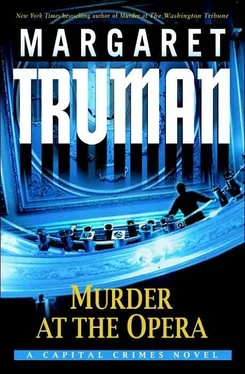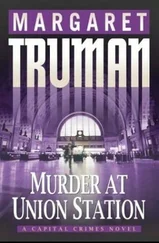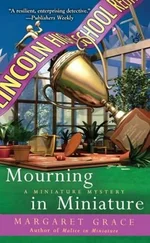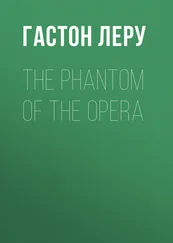“Mind if Ray joins us for breakfast?” Genevieve asked as she and Annabel shared a taxi.
Annabel didn’t respond.
“Is there a problem?” Genevieve asked.
“Oh, no, of course not,” Annabel said, not admitting that she did have a problem. “By all means, ask him to come.”

Chris Warren sat alone in an interrogation room, the same one in which he’d been questioned earlier. Berry, Portelain, and Johnson observed him through the one-way glass.
“He give you a hard time?” Berry asked.
“No,” Johnson answered. “He balked at coming with us, but only verbally. Came along nice and peaceful.”
“What did you tell him?”
“Only that we had some more questions for him. We didn’t say what it was about. We didn’t mention Baltsa.”
“Good. I sent a team out to National Airport to look for Melincamp. We checked passenger manifests for flights going to Toronto today-Air Canada, United, and U.S. Air. No Melincamp booked on any of them.”
“Maybe he flew someplace else,” Willie offered.
“That’s always a possibility,” Berry said, “although why tell you he was going back to Toronto?”
“To confuse us,” Johnson said.
“If so,” Berry said, “I’d view that as consciousness of guilt. I put an APB out for him.”
“He was a bundle of nerves when we talked to him,” Johnson said.
“Like maybe he’d just offed somebody,” Willie said.
Berry looked through the window at Warren again. “All right,” he said, “you two lay it on the line for him, see if he breaks.”
“What about his lawyer?”
“I’ll notify the Canadian Embassy again, but I won’t rush. See what you can get from him before I do.”

Johnson sat across the table from Warren. Portelain stood behind him.
“Okay, Chris,” Johnson said, her voice and smile friendly, “let me get right to the point of why you’re here. When did you last see Ms. Baltsa?”
The question generated confusion on his face. “Zöe?”
“Why don’t you let me ask the questions first?” Johnson said.
Warren looked nervously back at Portelain, who leaned against the wall, arms crossed over his massive chest, a scowl on his face.
“When did I see her? I don’t know, maybe a day ago, maybe two.”
“You’re sure about that?” Johnson asked, her eyes confirming that the tape in the small machine on the table was running.
“Yeah, I’m sure. Why? Is something wrong with that?”
Willie pushed away from the wall and leaned over Warren. “You know what, dude?” he said. “You might be one hell of a piano player, but you suck as a liar.”
“I’m not lying.”
“The hell you’re not.” Portelain now pulled up a chair next to Warren. “Where were you last night, say around midnight?”
“I was-”
“Careful,” Willie said. “You flunk as a liar, so you might as well start telling the truth. Where were you?”
“Home. At the apartment. I-”
“Chris,” Johnson said softly, “we know you visited Ms. Baltsa at midnight at the Hotel Rouge. We’ve got a positive ID on you, and your prints are all over the hotel room.”
“I forgot.”
The slap of Willie’s ham-hock hand on the table jarred both Warren and Johnson, and sent the small tape recorder an inch into the air.
“Look, my man,” Willie said, “you don’t seem to get it. You say you forgot going to see her at midnight last night. You forget stickin’ her in the chest with a knife, too?”
“Oh, no,” Warren said, jumping up from his chair and going to the room’s only window.
“Sit down,” Willie said.
“She’s dead?” Warren moaned from where he stood.
“Yes, she’s dead,” Johnson confirmed. “Now, why don’t you sit down and tell us all about it.”

Philip Melincamp vomited in a men’s room at U.S. Air at Reagan National Airport before boarding a shuttle to New York City. He felt faint for most of the flight, his plight noticed by a flight attendant, who asked, “Are you all right, sir? Is there something I can get you?”
“No, no, nothing. Thank you. It’s just a cold, maybe the flu.”
She kept a wary eye on him for the duration of the short flight to New York’s LaGuardia Airport. She kept a wary eye on everyone.
At LaGuardia Airport, he stepped in front of other passengers waiting in a taxi line, ignoring their shouts of protest, and gave the driver an address on Steinway Street, in the Astoria section of Queens, an area known as “Little Egypt.” After some wrong turns that took them past dozens of Middle Eastern grocery stores, restaurants, and clubs, the cab pulled up in front of a café whose sign boasted AUTHENTIC ARAB CUISINE AND HOOKAH. He paid the driver, overtipping him, and dragged his two small, wheeled suitcases behind him into the restaurant. A short, swarthy man looked up from where he’d been counting money. “Can I help you, sir?”
Melincamp looked to the back of the long, narrow room, where four men sat drawing in shisha, fruit-flavored tobacco, through the water pipes known as hookahs, the smoke shrouding their faces and creating swirling patterns as it gravitated to recessed lighting fixtures in the low ceiling. “I came to see someone back there,” Melincamp said, shoving his luggage into a corner of the entryway and walking to the rear. A young Arab man removed the pipe from his mouth and frowned up at Melincamp.
“Can we talk?” Melincamp said, aware of sweat running down his cheeks.
Without responding, the Arab placed the pipe in its holder and went to a door leading from the hookah room to an alley. Melincamp followed. They climbed a wooden set of exterior stairs to an apartment above the café, where another Arab male, considerably taller and heavier than the first, sat at a scarred, yellow kitchen table, an Arabic newspaper open in front of him. His swarthy face was deeply pitted from acne. He wore a traditional male Arab headdress-a keffiyeh-in a black-and-red pattern and secured by an egal, a thin rope circlet.
“Why do you come here?” the man at the table asked.
Melincamp turned to the man who’d led him upstairs. “Joseph said to come here if there was trouble.”
“Is there trouble?” the man at the table asked.
“Yes.”
Another large man stepped from behind curtains separating the small kitchen from another portion of the apartment.
“I can explain,” Melincamp said.
“I am listening,” said the man, who closed the newspaper and glared at Melincamp in a way that drained blood from the talent agent’s face and turned his legs to jelly.
Melincamp grabbed hold of the back of a chair to support himself. He saw a glass half filled with water on the table. “Please,” he said, “could I have some water?”
The man picked up the glass and threw its contents into Melincamp’s face. Melincamp collapsed into the chair.
“It is too late for trouble,” the man said. “The plan goes forward. Are you ready?”
“No, but there is a reason, a good reason,” Melincamp said, his voice weak. “You see-”
He was struck from behind, and tumbled to the floor, unconscious.
There was a deathly silence as the dramatic, final minutes of Act II of Tosca played out. Twenty-three-hundred men and women in the Kennedy Center’s Opera House watched intently, many barely breathing, as Tosca and the evil Scarpia performed Puccini’s dramatic dance of lust and betrayal. Tosca has asked Scarpia in song how much he wants in return for sparing the life of her lover, Cavaradossi, who is in custody and scheduled to be executed.
Читать дальше















